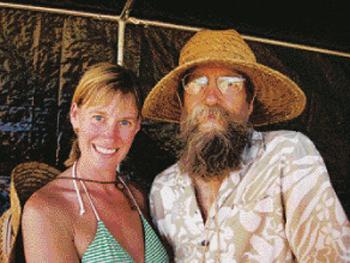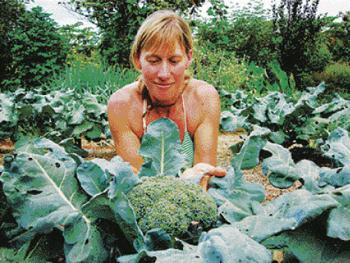MOLOA‘A — One Song Farm is one dynamic symphony of the most luscious fruit and vegetables imaginable. Size, color and quality are all grown organically by the sensei of seed, soil and, sun, which is coincidentally, the name this organic
MOLOA‘A — One Song Farm is one dynamic symphony of the most luscious fruit and vegetables imaginable. Size, color and quality are all grown organically by the sensei of seed, soil and, sun, which is coincidentally, the name this organic farmer chooses to carry.
In his previous life, Sun — no last name necessary — was a carpenter running million-dollar construction jobs in Southern California before moving to Kaua‘i and continuing in the building trade until 1989. After discovering good, fresh, home grown food he quickly joined the ranks of eat-healthy vegetarians.
Sun turned in his carpentry skills for a lifetime of soil husbandry and began farming with leased land in Kapahi. Five years of “double digging” vegetable beds by hand paid off for Sun in every step up the soil education ladder.
Double digging is digging by hand through the tough clay-hardened topsoil and go down two feet. Each bed is worked up with lots of compost and further enriched with worms.
“After about five years it’s a piece of cake. There’s no more tilling, you just throw seeds at it,” said Sun, pointing to a rainbow of fruit and vegetable color on his organic farm.
Working alongside Sun is Lisa Fuller, who is enthusiastically learning the organic farming process while dedicating her life energy to the fruitful success of One Song Farm.
“Using a spade, a fork and a large digging fork with long tines called a U-bar, we dig, turn over the soil and prep a 100-square-foot bed, one bed at a time. Every month when we crop out our produce, we put more compost back into the soil,” Fuller said. The organically produced compost is just one secret to One Song’s long success.
When Sun first arrived on Kaua‘i, he was told organic farming would never succeed on the island.
“The difficult we do right away, the impossible takes a little bit longer, that’s my credo,” said Sun, laughing as he recounts his 20 years of success. “Once you give the plants what they need, like the right variety, in the right soil, you are going to have produce that you simply can’t believe is so-o-oo good.”
Sun only uses fertilizers for his “startup plants,” and they must be organic.
“Synthetic fertilizers are very challenging and that’s where you’re going to get plant-eating pests. Fertilizers require knowing exactly how much to give a plant and that is an art in itself,” said Sun.
At One Song Farm, a strong focus is put on growing out plants to get the seed back. Seeds are saved from only the strongest plants, and the result is plants that thrive in Kaua‘i’s red soil.
“We have to be diligent about our seed selection and that means being on one piece of land for a very long time,” said Sun.
Another key factor is quality compost. There are four levels in Sun’s composting process. The first is to gather all the grass cuttings, dead plants, weeds, and fruit/vegetable table scraps collected each day and toss them in a four foot high wire enclosure.
As the organic material breaks down, the heat from within breaks down the various cuttings and weeds thrown in the center mass and plant life eventually becomes composting fertilizer.
The composting process continues until it reaches the last batch piled under a tarp. The result is dark, rich compost that will be thrown into the active plant beds. This black gold is the one key element that makes the magic of organic farming truly possible.
Another issue that faces Kaua‘i farmers is the nematode — a microscopic round worm that can either kill garden pests like cutworms or attack plants themselves.
Because nematodes will not infest a bed previously rooted with onion, Sun plants onions and garlic chives in a recently cropped out vegetable bed. Months later, after Sun harvests out the onion crop, he can follow up by planting whatever he wants in that recently rooted onion bed.
Sun and Phil Sheldon were instrumental in founding and creating Hawaiian Organic Farmers Association, which certifies organic farming under the prevailing USDA’s National Organic Program Federal Organic Rule. All products labeled as “certified organic” must be certified by a federally accredited third party organization. HOFA was among the first to be accepted by the USDA.
Sun’s thoughts on the subject of attaining sustainability through farming on Kaua‘i offers a logical solution to that desired goal.
“When you buy locally grown organic produce you are first and most importantly supporting local Kaua‘i farmers,” he said.
“Secondly, you are not contributing to the importing of oil, or contributing to the purchase of pesticide-contaminated crops from outside Kaua‘i.”
One Song Farm tours run Saturday 9 a.m. to noon. For a reservation, call 635-3020.



